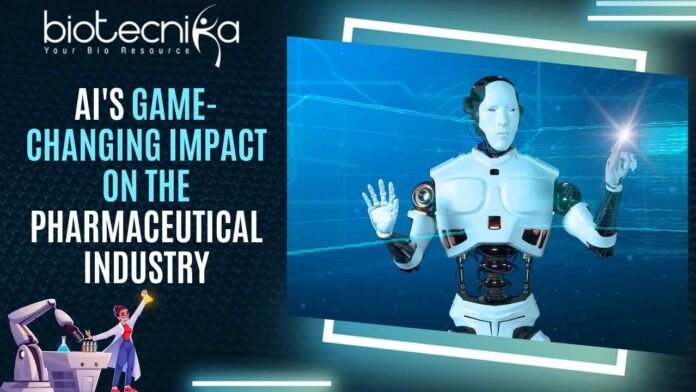AI’s Impact on the Pharmaceutical Industry – It’s Game Changing!
The pharmaceutical industry is undergoing a transformation that is driven by the power of AI. Previously known for its intricate research, from prolonged drug discovery timelines, as well as high costs. This sector is expanding AI to enhance innovation by identifying diseases, accelerating drug discovery, streamlining clinical trials, and optimizing manufacturing processes. Nowadays, AI is reshaping the future of medicine. The pharmaceutical industry now has access to large amounts of biological, chemical, and patient data, which enables them to unlock AI’s full potential.
Revolutionizing Drug Discovery and Reducing Costs & AI’s Impact on the Pharmaceutical Industry
Developing a new drug is an extensive process, often taking over a decade, and requires billions of dollars. However, AI is changing this approach by considerably reducing the time and resources needed to bring new treatments to market. Advanced machine learning models can rapidly analyze large datasets of chemical compounds, biological interactions, and disease mechanisms, allowing researchers to predict how potential drugs will interact with specific targets. This predictive capability reduces the reliance on costly and time-consuming laboratory experiments.
AI transforming drug repurposing, a process where old medications are evaluated for new therapeutic purposes . Previously, these discoveries were made by chance. For example, aspirin was initially developed as a pain reliever, but it was found to have blood-thinning properties beneficial for heart disease prevention. Likewise, Ozempic, initially used for diabetes management, is now used for weight loss. This AI-driven analysis allows the researchers to systematically asses approved drugs for the latest applications, which accelerates the development of effective treatments while minimizing costs as well as risks.
Enhancing Clinical Trials and Research
Clinical trials play an important part in the drug development process. It plays as essential role in enhancing these trials by improving patient recruitment, designing more effective study protocols, as well as monitoring patients in real time. Conventional methods often difficult to find diverse as well as eligible participants. Nowadays, AI can rapidly scan medical records, genetic data as well as patient medical history to match suitable candidates to trials more efficiently.
Once a trial is underway, AI-powered analytics help monitor patient responses and adjust protocols in real-time. This not only increases the likelihood of trial success but also reduces dropout rates and ensures that treatments are tested on a representative population. On the other hand, AI-driven simulations can predict potential outcomes, which allows researchers to refine study designs even before the trials begin, ultimately paving the way to market approval.
Advancing Personalized Medicine with AI
AI has a considerably high impact on the development of personalized treatment processes and precision medicine. One can get tailored treatment options based on an individual’s genetic makeup and biological characteristic features.
AI is also helpful in speeding up the analysis of massive datasets. It involves the study of genomic sequence and biomarker responses. One of the most important impacts of AI in drug development is its ability to predict how the patient responds to specific drugs and the identification of reactions in advance. This is a breakthrough as it allows more targeted therapies, thereby reducing the severe side effects of drug reactions post-treatment procedures.
Also, AI assists researchers in assessing drug efficacy in various population groups by processing real-world data from electronic health records and clinical studies. Thus, maximizing the treatment approach for different patient groups optimizes health outcomes. The AI platform to identify new patterns in data would create a doorway for the personalization of treatment approaches.
The Future of AI in Pharmaceuticals
As AI has been incorporated into the pharmaceutical industry, itis revolutionizing every stage of drug development, starting from discovery and testing to manufacturing and patient care. AI also helps accelerate research, optimize trials, and personalized medicine. AI is making this entire process more efficient, cost-effective, and patient-centric. As technology continues to evolve, its contribution in changing the future of healthcare will only expand, bringing faster, safer, and more innovative treatments to patients worldwide.



























